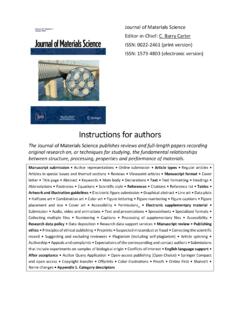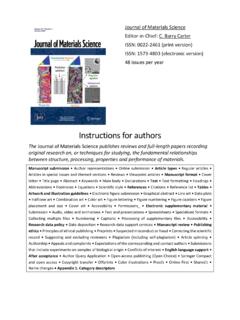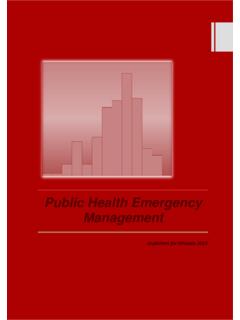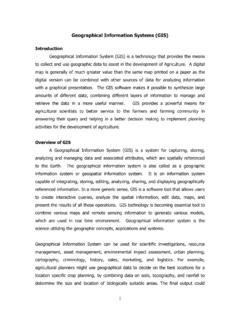Transcription of Manuscript Submission Guidelines - media.springer.com
1 Manuscript Submission Guidelines Digestive Diseases and Sciences (DDS) publishes peer-reviewed basic/translational and clinical studies and special articles on all aspects of gastroenterology and hepatology and related fields. Please review full Submission Guidelines for information related to authorship, ethics and availability of data and materials. Manuscript Quality and Review Process Manuscripts submitted to Digestive Diseases and Sciences (DDS) should be concise, well organized, and clearly written. Acceptance of manuscripts will be based on originality and importance to the field of digestive diseases.
2 Submitted manuscripts are reviewed by the editor-in-chief and associate editors and, in the majority of cases, by two or more experts in the field. The editors can choose to reject a Manuscript without peer review if the Manuscript is of insufficient quality or relevance to warrant acceptance. Articles are routinely checked for duplication; those that excessively re-use the text from their own published work or that from of others will not be published. If data from another publication are included out of scientific necessity, this should be clearly stated in the Manuscript , referenced, and the appropriate permissions must be acknowledged.
3 Moreover, how the submitted work differs from prior publications should be specifically stated. The editors reserve the right to reject poorly written manuscripts regardless of scientific content or importance. Submissions deemed of substantial scientific value but poorly written may be returned to the authors for editing by a professional editing service or native English speaker. Springer reserves the right to copyedit accepted manuscripts. Proofs will be sent to the corresponding author for final approval and must be returned within 48 hours of receipt.
4 Please note that DDS does not accept material written by or with the substantial assistance of professional medical writers, in particular those sponsored by the pharmaceutical industry. SPECIFIC CONSIDERATIONS The following Submission categories are either not encouraged or require attention to specific instructions: Alternative medicine: Interventions considered as alternative, nontraditional, or ethnopharmacologic are generally considered to have been derived from ancient medical practices such as the use of herbal extracts and chemical mixtures that are not rigorously defined or standardized.
5 The lack of standardization of these substances is likely to affect reproducibility and also limit the use to areas where such treatments are considered acceptable. Due to these considerations, such articles may either be returned to the authors or transferred by the publisher for consideration by a more appropriate journal at the discretion of the editor and the Springer Transfer Desk. Submissions that use defined chemical compounds or standardized nontraditional practices , or reviews or analyses of such practices will generally be excluded from these considerations.
6 Derivative studies: Submissions in which the principal purpose is to re-analyze previously published data will be classified as derivative studies. To be considered for publication, they must fulfill all of these criteria: 1) The parent paper must have been accepted for publication prior to Submission to DDS of any derivative studies. 2) The complete, accepted version of the parent publication has to be clearly cited in the DDS Submission . Citation to abstracts, preliminary papers, or making of papers is not acceptable.
7 3) A full text version of the published parent publication must be available to the editors and reviewers of the DDS Submission in order to enable full comparison of the data. 4) The child paper must be of clear significance and advance the field in its own right. 5) Figures, data tables, methods, and other material cannot be duplicated verbatim from the parent paper without the permission of the publisher of the original paper and must be cited appropriately. The authors may cite identical methods and data in the child study.
8 6) In the Introduction, the authors of the child paper must clearly state that the data in the submitted work are based on original data that were published previously, and must justify the significance and importance of re-analyzing their published data, stressing how new conclusions and insights generated from their re-analysis advance the field. Iterative, repetitive, or incremental studies: Although confirmatory studies often have value, the Submission of studies in which near-identical methods are used to assess the efficacy of a succession of treatments tested in a standard disease model or in vitro system, particularly when the study is part of a large series of similar studies from the same laboratory, is discouraged, since these studies are usually not designed to test a thoughtful hypothesis or to gain insight into disease mechanisms or pathophysiology.
9 But rather serve to maximize the number of publications given the capabilities of the laboratory. In vitro only studies: Experiments that rely on in vitro models, such as isolated tissues, cell cultures, or other organ models, are generally enhanced by confirmatory studies using animal models or even clinical studies. At their discretion, our editors will likely reject or recommend consideration by a more appropriate journal of submissions reliant on data obtained solely from in vitro systems. Inquiries All inquiries should be addressed to the managing editor or to the editor-in-chief, preferably by email: Managing Editor Meghan Keeffe Email: Fax: 415-383-8428 Editor-in-Chief Jonathan D.
10 Kaunitz, MD, FACG, AGAF UCLA School of Medicine Bldg. 114, 217E West Los Angeles VAMC Los Angeles, CA 90073 USA Categories of Manuscripts Digestive Diseases and Sciences is dedicated to publishing novel and groundbreaking science pertaining the fields of gastroenterology and hepatology. In general, our editors favor scientific work that provides new insights into an important clinical or basic question, perhaps leading towards the understanding of a disease mechanism, providing insight into optimizing disease management, describing new diagnostic methods that are superior to existing approaches, or any other finding that advances the field.









